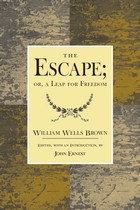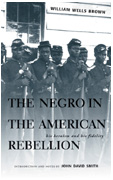
The Escape centers on the attempted sexual violation of a slave and involves many characters of mixed race, through which Brown commented on such themes as moral decay, white racism, and black self-determination. Rich in action and faithful in dialect, it raises issues relating not only to race but also to gender by including concepts of black and white masculinity and the culture of southern white and enslaved women. It portrays a world in which slavery provided a convenient means of distinguishing between the white North and the white South, allowing northerners to express moral sentiments without recognizing or addressing the racial prejudice pervasive among whites in both regions.
John Ernest’s introductory essay balances the play's historical and literary contexts, including information on Brown and his career, as well as on slavery, abolitionism, and sectional politics. It also discusses the legends and realities of the Underground Railroad, examines the role of antebellum performance art—including blackface minstrelsy and stage versions of Uncle Tom's Cabin—in the construction of race and national identity, and provides an introduction to theories of identity as performance.
A century and a half after its initial appearance, The Escape remains essential reading for students of African American literature. Ernest's keen analysis of this classic play will enrich readers’ appreciation of both the drama itself and the era in which it appeared.

In 1863, as the Civil War raged, the escaped slave, abolitionist, and novelist William Wells Brown identified two groups most harmful to his race. “The first and most relentless,” he explained, “are those who have done them the greatest injury, by being instrumental in their enslavement and consequent degradation. They delight to descant upon the ‘natural inferiority’ of the blacks, and claim that we were destined only for a servile condition, entitled neither to liberty nor the legitimate pursuit of happiness.”
“The second class,” Brown concluded, “are those who are ignorant of the characteristics of the race, and are the mere echoes of the first.” Four years later, Brown wrote the first military history of African Americans, The Negro in the American Rebellion. This text assailed those whose hatred and ignorance inclined them to keep blacks oppressed after Appomattox.
This critical edition of The Negro in the American Rebellion, one of Brown’s least-analyzed texts, is the first to appear in more than three decades. In his introduction, historian John David Smith identifies the text’s Anglo-American abolitionist roots, sets it in the context of Brown’s other writings, appraises it as military history, analyzes its interpretation of black masculinity and honor, and focuses closely on Brown’s assessment of contemporary racial tensions.
Largely ignored by scholars, The Negro in the American Rebellion, Smith argues, is a powerful transitional text, one that confronted squarely the neo-slavery of the Reconstruction era.
“Whites,” Brown wrote, “appear determined to reduce the blacks to a state of serfdom if they cannot have them as slaves.” His important text was a call to arms in the ongoing race struggle. Smith’s analysis, framed within recent scholarship on slavery, emancipation, and African American participation in the U.S. army, is long overdue.
READERS
Browse our collection.
PUBLISHERS
See BiblioVault's publisher services.
STUDENT SERVICES
Files for college accessibility offices.
UChicago Accessibility Resources
home | accessibility | search | about | contact us
BiblioVault ® 2001 - 2024
The University of Chicago Press









